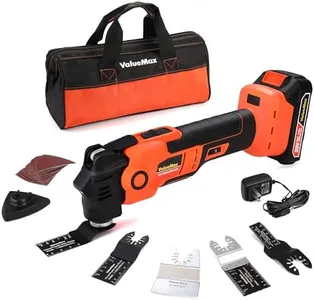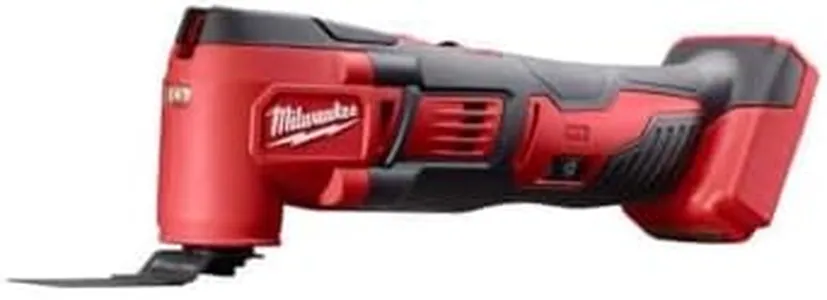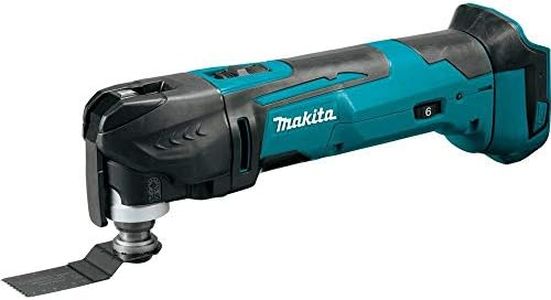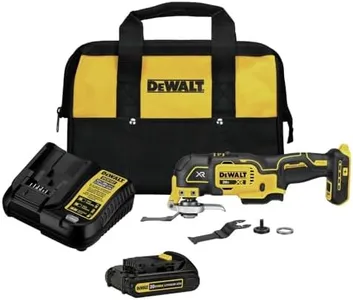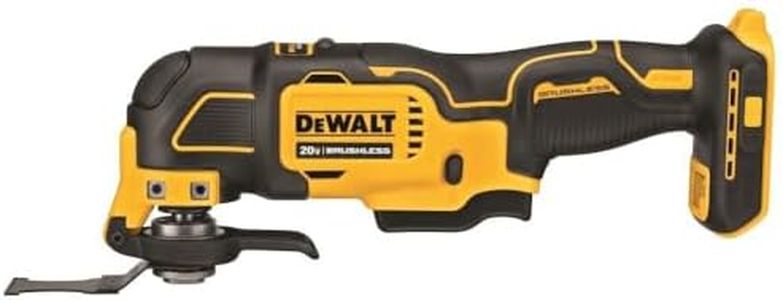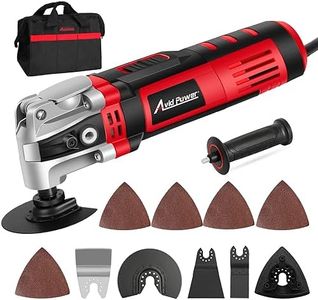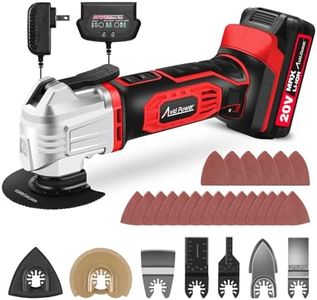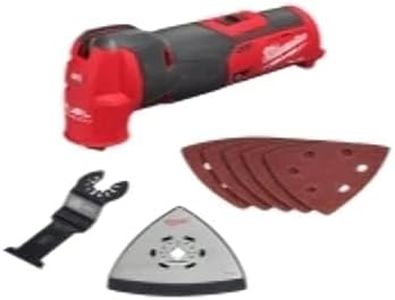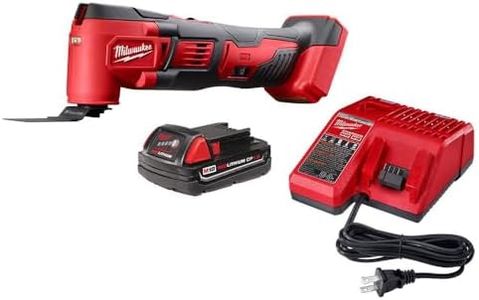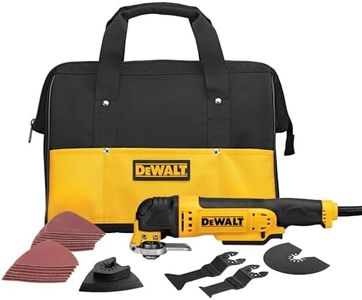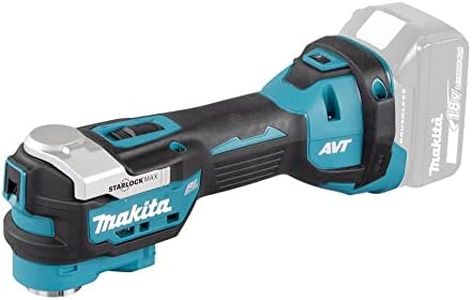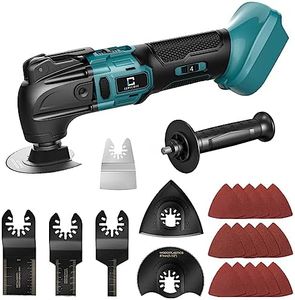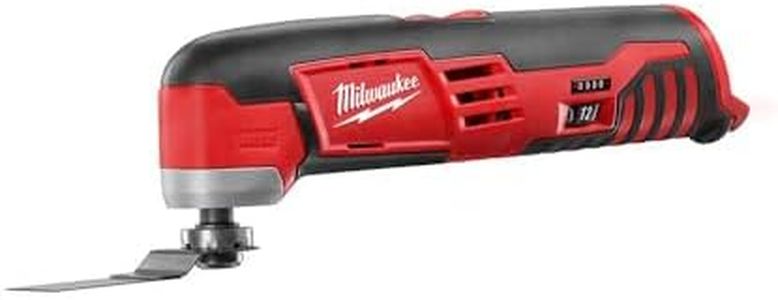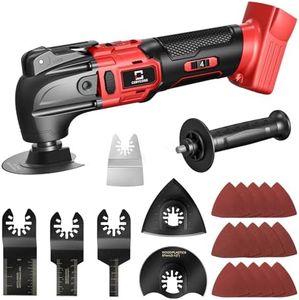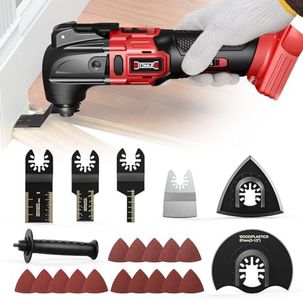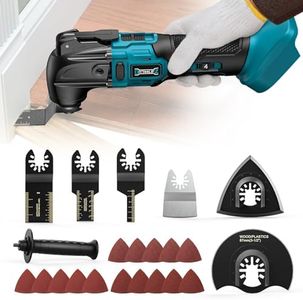10 Best Oscillating Tools 2025 in the United States
Our technology thoroughly searches through the online shopping world, reviewing hundreds of sites. We then process and analyze this information, updating in real-time to bring you the latest top-rated products. This way, you always get the best and most current options available.

Our Top Picks
Winner
Milwaukee 2626-20 M18 18V Lithium Ion Cordless 18,000 OPM Orbiting Multi Tool with Woodcutting Blades and Sanding Pad with Sheets Included (Battery Not Included, Power Tool Only)
Most important from
5146 reviews
The Milwaukee 2626-20 M18 Multi Tool stands out in the oscillating tools category with its impressive power and versatility. With a maximum oscillation speed of 18,000 OPM and 12 speed settings, it can handle a wide range of tasks, from delicate sanding to heavy-duty cutting. This adaptability makes it a great choice for DIY enthusiasts and professionals alike, as it can efficiently tackle various projects with ease.
Durability is another strong point, featuring an all-metal gear case that enhances its longevity and resistance to impacts on the job site. The rubberized handle improves ergonomics by providing a secure grip, reducing the risk of slippage during use, even in challenging conditions. Additionally, the built-in LED lighting is a thoughtful touch, ensuring you can see your work clearly from any angle, which is especially helpful in dimly lit environments.
One of the downsides to consider is that this tool does not come with a battery, which means you'll need to invest in a compatible M18 battery to use it. This could be a drawback if you're not already part of the Milwaukee ecosystem. Additionally, while the tool is lightweight at just over 3 pounds, some users may find it slightly bulkier compared to other models, depending on their preference for tool handling. The inclusion of various attachments, such as wood cutting blades and sanding pads, adds value and versatility, making it suitable for multiple applications.
Most important from
5146 reviews
Makita XMT03Z 18V LXT® Lithium-Ion Cordless Multi-Tool, Tool Only
Most important from
5547 reviews
The Makita XMT03Z 18V LXT® Lithium-Ion Cordless Multi-Tool is a practical choice for DIY enthusiasts and professionals looking for a reliable oscillating tool. One of its key strengths is the variable speed control, offering a wide range from 6,000 to 20,000 oscillations per minute (OPM), which allows you to adjust the speed based on the task at hand. The 3.2° oscillation angle is designed for aggressive cutting and sanding, making it efficient for various applications.
Ergonomically, the tool features a small diameter barrel grip that promotes comfort and control during use, which is especially beneficial for extended projects. Additionally, the on/off slide switch with a lock-on button enhances convenience, making it easy to operate.
Being cordless, it offers great mobility without the hassle of tangled wires, as long as you have a compatible Makita 18V Lithium-Ion battery (sold separately). It also includes adapters that let you use most competitive accessories, increasing its versatility. However, the tool does not come with a battery or charger, which adds to the initial investment if you do not already have Makita batteries. While it’s lightweight at 4 pounds, some users might find the lack of included attachments limiting, depending on their specific needs.
Most important from
5547 reviews
Milwaukee 2836-20 M18 FUEL Brushless Lithium-Ion Cordless Oscillating Multi-Tool (Tool Only)
Most important from
494 reviews
The Milwaukee 2836-20 M18 FUEL Brushless Lithium-Ion Cordless Oscillating Multi-Tool is designed for a range of cutting and sanding tasks, making it suitable for both DIY enthusiasts and professionals alike. One of its standout features is the variable speed dial, allowing users to adjust the oscillation speed based on the material and application. This flexibility can enhance precision, especially with the auto-load feature that starts at a lower speed for accuracy before ramping up for efficiency. Its oscillation angle of 4.2 degrees helps in achieving faster cuts, while the integrated 180-degree LED light improves visibility in dark working conditions, a significant plus for intricate tasks. Additionally, the tool employs vibration dampening technology, reducing user fatigue during extended use.
On the downside, being a battery-powered tool, it can be less powerful than corded models for heavy-duty jobs. The reliance on an 18-volt battery means you may need to manage battery life and charging, particularly for larger projects. Also, as it's sold as a tool-only option, you'll need to purchase the battery and charger separately, which could increase the initial investment. The device's relatively lightweight design (3.12 pounds) is great for maneuverability, but some users might find it less robust compared to heavier models.
This oscillating multi-tool excels in versatility and user-friendly features, making it a solid choice for those looking for a reliable tool for various cutting and sanding tasks. Potential buyers should consider the need for additional accessories and battery management when deciding if it fits their specific project needs.
